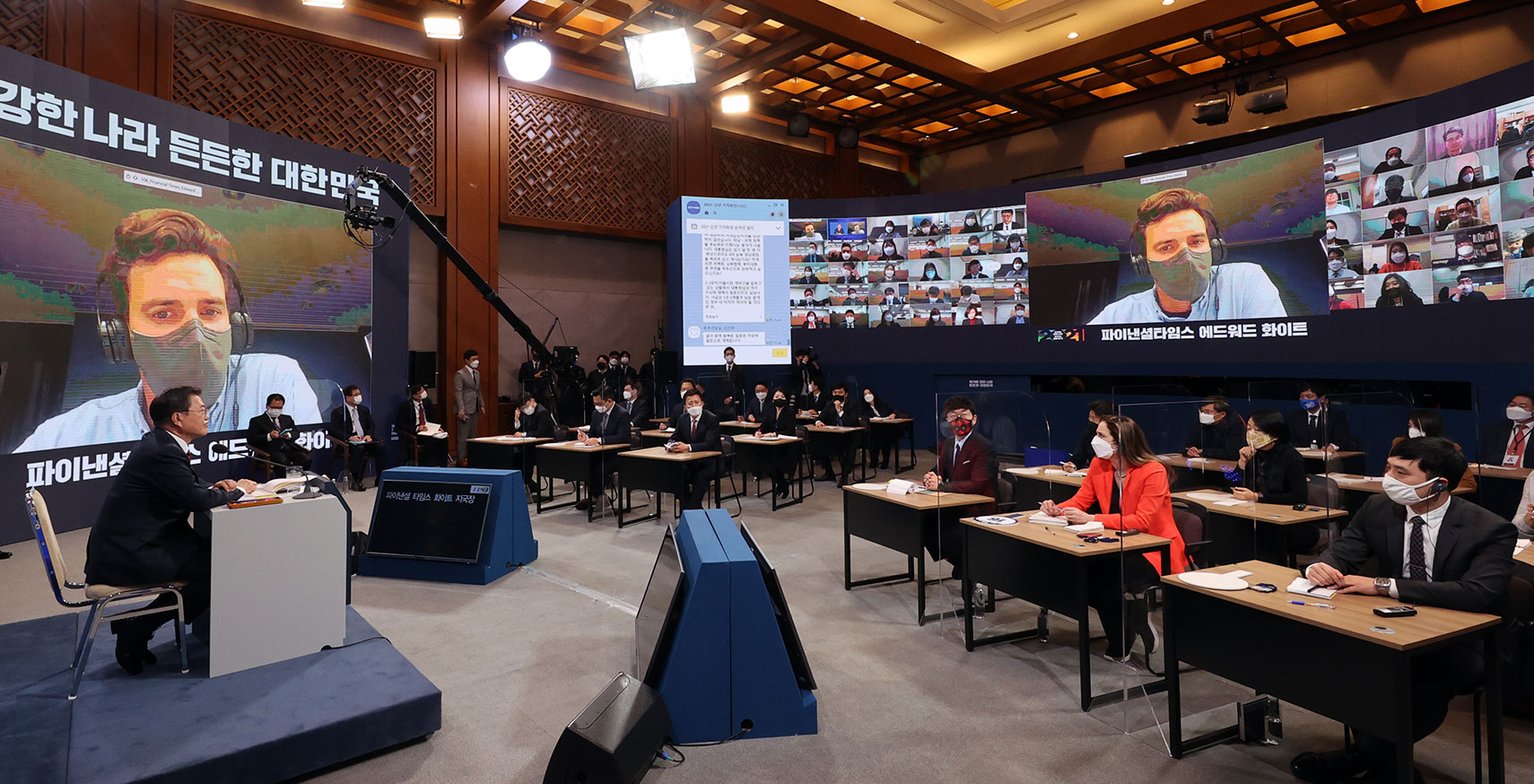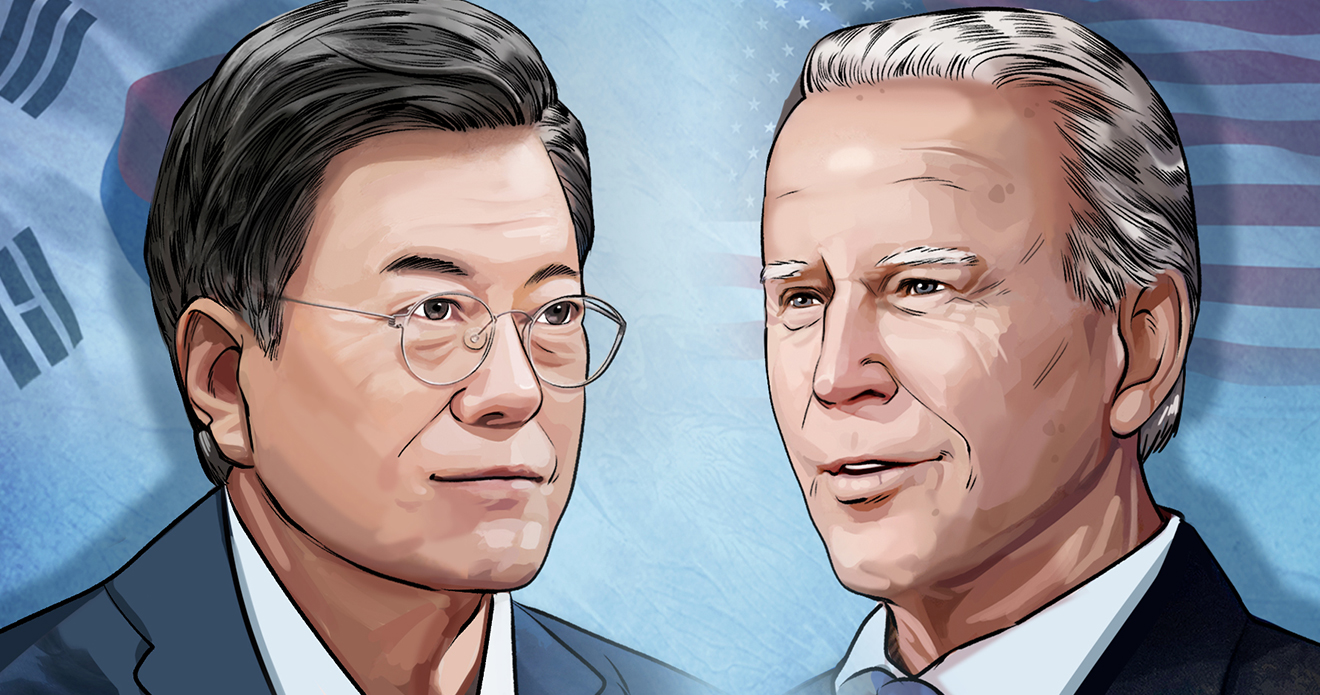February 2021

February 2021
With just less than 1.5 years left of his term, President Moon Jae-in has nothing more important than safety and prosperity of the people and also peace on the Korean Peninsula. While focusing on recovering from the unprecedented pandemic, the Moon administration continues to work on renewing talks with North Korea and resolving the longstanding conflicts with Japan over wartime forced work and sexual slavery.
Written by
Sohn Ji-ae
 © YonhapNews
© YonhapNews
After a year of unexpected challenges from COVID-19, people grow hopeful for 2021 to be a better year. Many world leaders in their New Year’s address laid out their priorities to be accomplished in the year, which were mostly unsurprisingly, containing the virus and getting the battered economy back on track.
Another top item on many leaders' agenda is to resume a backlog of diplomatic tasks caused by either the prolonged pandemic or political reasons.
President Moon Jae-in, too, who does not have much time with his term in office set to end in May 2022, is eager to tackle the last major components of his administration’s diplomatic agenda. Speaking in his New Year’s address and at the following news conference, the president reaffirmed his commitment to not only overcoming COVID-19, but also improving relations with the country’s neighbors and allies.
Among others, North Korea remains his administration's major objective and the importance of resuming the stalled dialogue with the northern neighbor grows as Pres. Moon faces the prospect of political change in the U.S.
 © YonhapNews
© YonhapNews
President Moon expressed his expectation that U.S. President-elect Joe Biden and his incoming administration would provide "a new opportunity to restart dialogue between N. Korea and the U.S. and also between S. and N. Korea.” "Many in the Biden administration have a great deal of expertise on Korean Peninsula issues and they see the importance of dialogue,” he said. “I believe that the North Korea issue will be a priority in U.S. diplomacy.”
Pres. Moon also urged President Biden to build upon the achievements and learn from the failures of his predecessor’s diplomatic engagement with N. Korea.
Pres. Moon had spearheaded the effort to set up three historic U.S.–North Korea summits, starting with the Singapore summit in 2018. The Singapore summit led to a joint declaration between Washington and Pyongyang, in which the North Korean leader made a firm commitment to complete denuclearization, in return for the U.S. providing security guarantees and easing sanctions. However, their diplomacy stalemated over disagreements over U.S. sanctions.
Foreign media spotlighted Pres. Moon’s resolution to work closely with the new Biden administration. Bloomberg on Jan. 18 wrote that South Korea “seeks an early summit with Pres. Biden to revive nuclear talks…and hopes the former vice president’s entry to the White House could be a turning point for relations with Kim Jong Un.” The Associated Press (AP) reported, “The South Korean leader has been desperate to keep alive a positive atmosphere for dialogue in the face of [North Korean leader] Kim’s vows to further expand a nuclear and missile program that threatens Asian U.S. allies and the American homeland.”
Improving relations and settling historical issues with one of the country's closest geographical neighbors& — Japan — is another major task that President Moon and his administration will continue to carry on. Recently, the Seoul Central District Court on Jan. 8 ruled that Japan compensate Korean victims of sexual slavery before and during WWII. When the ruling exacerbated the tense Seoul-Tokyo relations, Pres. Moon claimed, "The past is in the past. Ensuring bilateral relations improve in a future-oriented way is another problem at hand.”
He then acknowledged that Seoul and Tokyo in 2015 reached an agreement on the issue, and based on this accord, he vowed to negotiate a solution that the victims would agree with.
There are growing expectations that major international events and meetings, which were mostly canceled or done virtually last year due to the pandemic, are likely to be held "in-person" this year.
Recently, the U.K. announced that it would hold the first in-person meeting of the Group of Seven (G7) nations in June, to which Prime Minister Boris Johnson invited Korea as a guest. In the same month, Seoul will be the host of Green Growth and the Global Goals 2030 (P4G) Summit. With the possibility of face-to-face meetings growing, hopefully, President Moon will bring world leaders closer to achieving objectives that he had pledged.